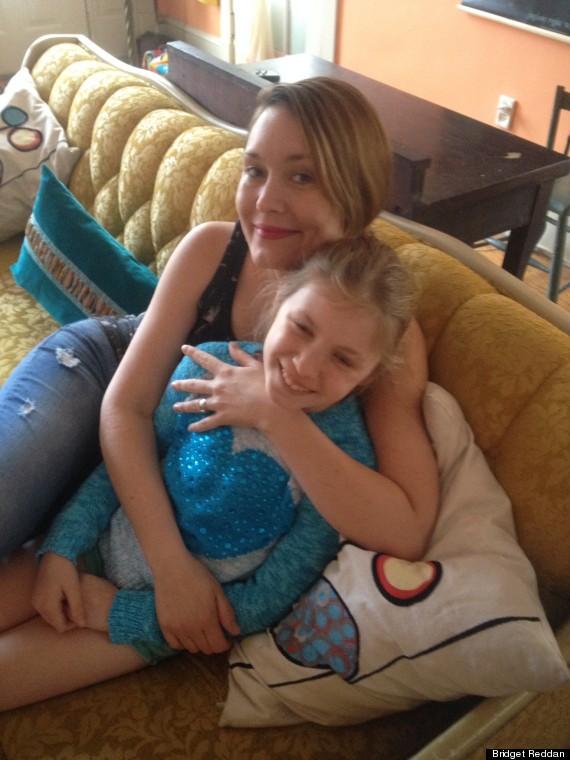Ten years ago, as my husband and I fumbled into line at Blockbuster Video with our too-large, over-accessorized first time parents' stroller, I thought my life was over. Actually, that is too figurative: I thought I was already dead.
As I stood motionless, the other customers in the store served as a type of memorial video -- there I was, a young happy girl selecting slumber party material. There was me at 20 in the foreign film section; me only a year before snuggling into the arms of the man I desperately loved, about to rent a movie we would never see due to our fervent love-making.
The ghost me standing in that line was not so much a drama queen as she was in the throes of postpartum depression. For six months, I had trouble sleeping, racing thoughts, extreme anxiety, dread and suicidal thoughts. My husband would come home to find various configurations of alarm: The couch in the kitchen because of my bizarre need to rearrange the furniture; a closet or room torn apart and emptied; strange and complicated meals half-prepared. Most often, he walked into an apartment with an un-showered wife holding her crying infant daughter as she herself sat sobbing, eyes averted from the elephant in the room: I did not feel a bond with my daughter.
I can say this with certainty now. A decade and two more daughters later, I know what it is like to have a normal postpartum period. I even know what it is like to experience that time as down-right blissful. I know the feeling of holding my 7-year-old and my 2-year-old when they are crying until our rhythms synchronize and they quiet. But this is not their story: Those lucky two who had a sane mommy that physically, emotionally, spiritually, psychically and unconsciously bonded with them.
No one would say Izzy was an easy baby. The word most often used by reminiscing family members is serious. As in, the nice word for contemptuous. Whether my mental state was responsible for this or not, no one will ever know. What I do know for certain is that baby, insolent as she was, did not make me crazy. Luckily, I was too deranged to realize the extent of my mental collapse or I may have resented her. What I did, instead, was regard her as an alien. This "other" that did not feel of my body. This tiny bundle of need I was certain I would kill for lack of proper baby know-how.
When the worst of the postpartum depression retreated somewhere around Izzy's six month birthday, so too did the hope of that natural maternal bond. Yes, I was no longer a complete lunatic. Furniture stayed put. I could sleep better, organize my thoughts, imagine living another few years... What I could not do in any way was feel for her. Perhaps a side of effect of still lingering anxiety, I became hyperaware of this lack of feeling. As a result, I thought about everything. When she was hurt, I was all head. There was a robotic chain of command that would take place and her needs would be met. I knew logically that children needed to be touched so I consciously made decisions to snuggle her. I read to her, bought her all the right developmental toys. I did not feel like doing any of it.
Woe is the tale from which we do not learn. In my case, regarding Izzy as this other being has had some surprising benefits. Somewhere along the way, being so conscious in my dealings with her became second nature. Which is still quite different than, say, how I regard my middle daughter, Hilde, who came to the world a cherubic joy-ball of squishiness at a time when I was mentally well. There was nothing deliberate about raising Hilde. She looked like me, acted like me, felt of me. Dealing with her was and continues to be largely instinct, emotion. The downside of this is that I often overlook her as a separate person. I am always aware of Izzy.
This girl, now 10, with her flaxen hair and face full of freckles looks nothing like me. By nature or nurture (or both) she also acts nothing like me. Where I have been wracked by worry and insecurities, this child is a powerhouse of confidence and bravery. She is plucky and athletic. She cheats at soccer by secretly pinching the other players -- usually boys twice her size. Her honesty and lack of concern over other people's opinions often leaves me equal parts embarrassed, dumbfounded and swollen with pride. Judging from her reactions, I think Izzy feels much the same when I fret over the down-on-their luck neighbor or repeat my confidence-boosting mantras before performing some anxiety-producing task. Together we share our opinions, learn from each other and tease each other relentlessly.
Though I cannot say with certainty that my postpartum depression is responsible for the amazing relationship I now have with Izzy, I have grown to see it in a positive light. And over the years I have fallen deeply, madly and consciously in love with her. What a feeling.
